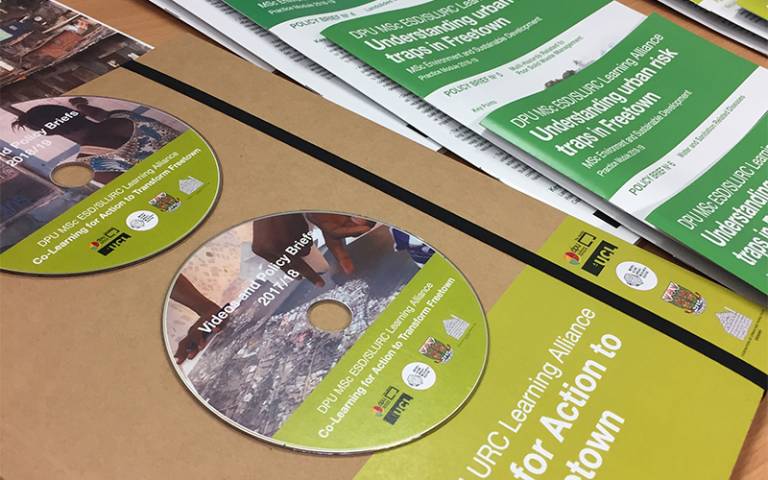Knowledge for disrupting risk in Freetown- MSc ESD and SLURC collaborative outputs launched online
12 September 2019
We are happy to share the outputs produced by the co-learning alliance between SLURC and the Practice Module of the MSc in Environment and Sustainable Development fieldwork in the form of thematic policy briefs and videos.

Since 2017, the Sierra Leone Urban Research Centre (SLURC) at Njala University and the practice-based module of the DPU’s MSc in Environment and Sustainable Development (MSc ESD), led by Adriana Allen and Rita Lambert, have formed a learning alliance that aims to co-produce actionable knowledge to support transformative actions towards a socially and environmentally just Freetown. On the ground, the learning alliance works in collaboration with local collectives of the urban poor across the city, the Federation of the Urban and Rural Poor (FEDURP) and partnering organisations working under the "Pull Slum Pan Pipul" (PSPP) programme.
Every year, we are joined by a group of local interns and community facilitators whose capacity and knowledge strengthens the work of the alliance. In 2018/19, the learning alliance brought together 105 people from 35 countries, including staff from SLURC and DPU, ESD MSc students, local interns and community facilitators.
We hare happy to share the outputs produced so far by the MSc ESD students in the form of thematic policy briefs and videos. The policy briefs are organised around key themes and seek to offer an explanation for how and why risk accumulation cycles or urban risk traps are produced and reproduced in the city of Freetown, and how they affect the development of the city and its dwellers. These can be download on our website here (link).
A comprehensive policy brief summarising the key findings is available for download on our website here (link).
The videos focus on the diagnosis and strategy building to disrupt risk traps in 7 informal settlements: Moyiba, Portee-Rokupa, Dwarzarck, Cockle Bay, Colbot, Susan's Bay and CKG (Crab Town, Kolleh Town and Gray Bush). These settlements offer a window into the different geographic, environmental, socioeconomic and political conditions under which informality and risk are intertwined in the development of Freetown. The latest videos from the 2019 fieldtrip have been published and are available online on the ESD overseas research page alongside outputs from previous years’ engagements.
Additionally, the Knowledge in Action for Urban Equality (KNOW) project supports the educational work of SLURC through Work Package 5, of which this co-learning alliance is one component. During our fieldwork in April/May 2019, we interviewed several team-members of the co-learning alliance and asked them a number of questions recorded in this video (link).
 Close
Close

